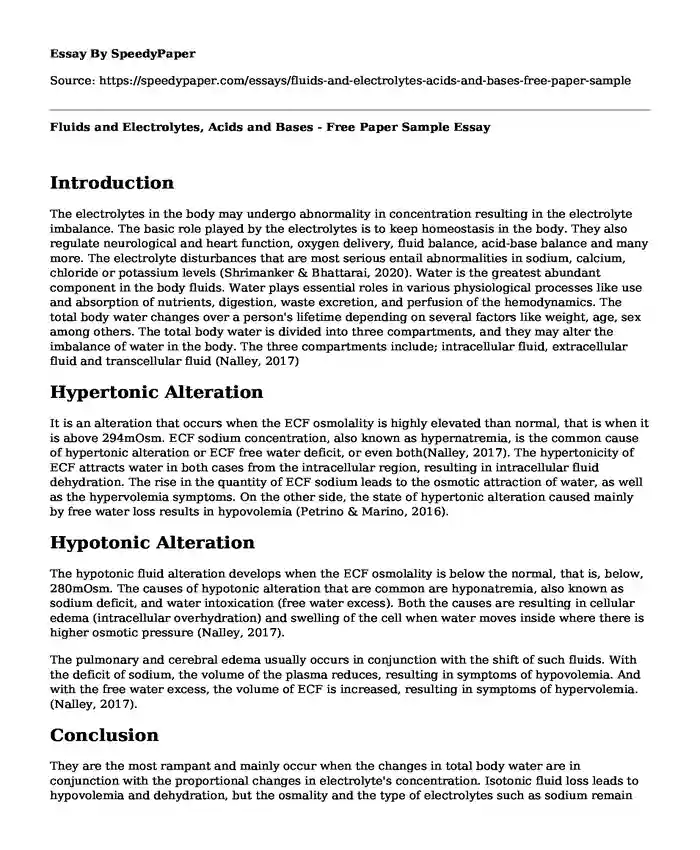Introduction
The electrolytes in the body may undergo abnormality in concentration resulting in the electrolyte imbalance. The basic role played by the electrolytes is to keep homeostasis in the body. They also regulate neurological and heart function, oxygen delivery, fluid balance, acid-base balance and many more. The electrolyte disturbances that are most serious entail abnormalities in sodium, calcium, chloride or potassium levels (Shrimanker & Bhattarai, 2020). Water is the greatest abundant component in the body fluids. Water plays essential roles in various physiological processes like use and absorption of nutrients, digestion, waste excretion, and perfusion of the hemodynamics. The total body water changes over a person's lifetime depending on several factors like weight, age, sex among others. The total body water is divided into three compartments, and they may alter the imbalance of water in the body. The three compartments include; intracellular fluid, extracellular fluid and transcellular fluid (Nalley, 2017)
Hypertonic Alteration
It is an alteration that occurs when the ECF osmolality is highly elevated than normal, that is when it is above 294mOsm. ECF sodium concentration, also known as hypernatremia, is the common cause of hypertonic alteration or ECF free water deficit, or even both(Nalley, 2017). The hypertonicity of ECF attracts water in both cases from the intracellular region, resulting in intracellular fluid dehydration. The rise in the quantity of ECF sodium leads to the osmotic attraction of water, as well as the hypervolemia symptoms. On the other side, the state of hypertonic alteration caused mainly by free water loss results in hypovolemia (Petrino & Marino, 2016).
Hypotonic Alteration
The hypotonic fluid alteration develops when the ECF osmolality is below the normal, that is, below, 280mOsm. The causes of hypotonic alteration that are common are hyponatremia, also known as sodium deficit, and water intoxication (free water excess). Both the causes are resulting in cellular edema (intracellular overhydration) and swelling of the cell when water moves inside where there is higher osmotic pressure (Nalley, 2017).
The pulmonary and cerebral edema usually occurs in conjunction with the shift of such fluids. With the deficit of sodium, the volume of the plasma reduces, resulting in symptoms of hypovolemia. And with the free water excess, the volume of ECF is increased, resulting in symptoms of hypervolemia. (Nalley, 2017).
Conclusion
They are the most rampant and mainly occur when the changes in total body water are in conjunction with the proportional changes in electrolyte's concentration. Isotonic fluid loss leads to hypovolemia and dehydration, but the osmality and the type of electrolytes such as sodium remain within the normal ranges that are 280mOsm to 294. Common causes are severe wound drainage, sweating, and hemorrhage. Excess isotonic fluid leads to hypervolemia, which is mainly caused by hypersecretion of aldosterone, kidney failure, or excessive intravenous fluids administration (Petrino & Marino, 2016).
References
Nalley, C. M. (2017). Fluids and electrolytes. The Harriet Lane Handbook E-Book, 289.
Petrino, R., & Marino, R. (2016). Fluids and electrolytes. Tintinalli's Emergency Medicine: A Comprehensive Study Guide. 8th ed. New York, NY: McGraw-Hill, 92-111
Shrimanker, I., & Bhattarai, S. (2020). Electrolytes. In StatPearls [Internet]. StatPearls Publishing. https://www.ncbi.nlm.nih.gov/books/NBK541123/.
Cite this page
Fluids and Electrolytes, Acids and Bases - Free Paper Sample. (2023, Nov 24). Retrieved from https://speedypaper.net/essays/fluids-and-electrolytes-acids-and-bases-free-paper-sample
Request Removal
If you are the original author of this essay and no longer wish to have it published on the SpeedyPaper website, please click below to request its removal:
- The Urinary System Essay Sample
- Free Essay: Political Order and Social Hierarchy in Late Imperial China, Tokugawa Japan, and Choson Korea
- Free Essay: How Far Is It Possible To Set Criteria for Experimental Ethnographic Writing?
- Essay Sample on Social Issues in Database System
- Essay Sample on Venezuela in Crisis: President Manduro's Mismanagement and Oppression
- Unravelling Yeast Metabolic Shifts Using DNA Microarrays - Research Paper
- Free Essay. Election Issues: Two Presidential Candidates
Popular categories





